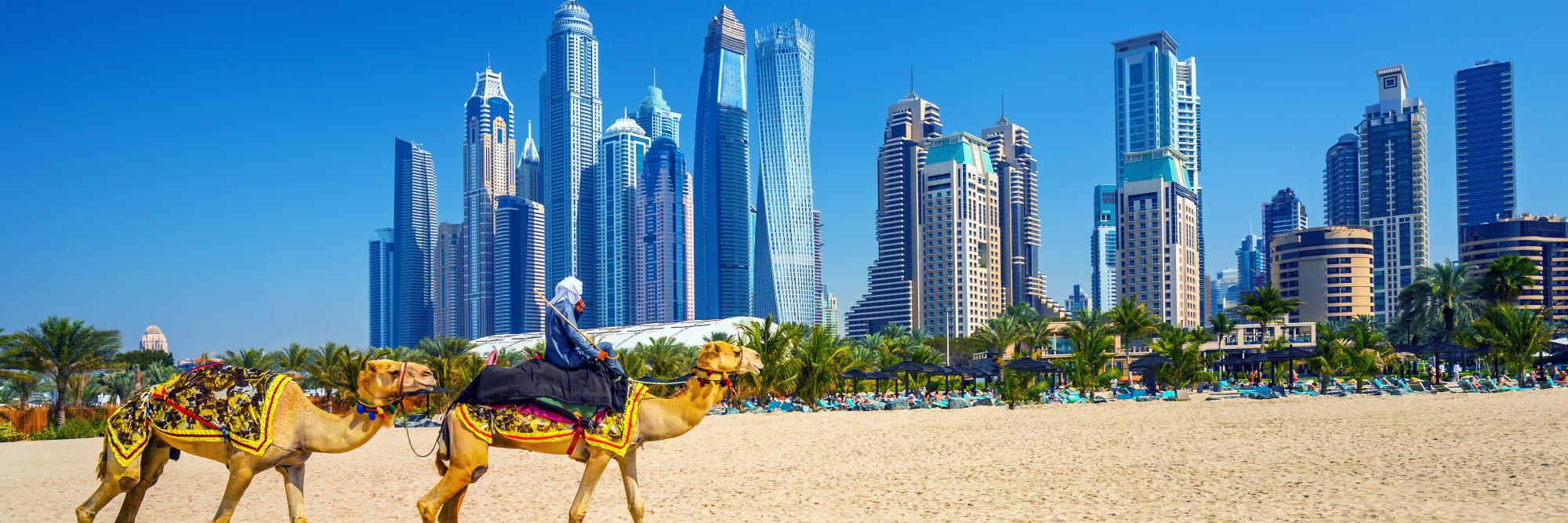Originally from the UK, Marianne moved to Dubai four years ago with her husband and two children. Despite the extreme climate and chaotic road traffic, Marianne is enjoying her life as an expat by embracing all that Dubai has to offer. Marianne is a freelance writer and editor, and you can read more about her new experiences in Dubai on her blog, Circles in the Sand.
To find out more about Dubai, have a look at our Expat Arrivals Dubai country guide or more expat experiences in Dubai.
About Marianne
 Q: Where are you originally from?
Q: Where are you originally from?
A: I’m originally from Woking, Surrey, in the UK, but we moved to the Middle East from Minneapolis in the US.
Q: Where are you living now?
A: Dubai, UAE
Q: How long have you lived in Dubai?
A: 4 years
Q: Did you move with a spouse/ children?
A: Yes, with my husband and two boys, who are now aged 3 and 6
Q: Why did you move; what do you do?
A: We moved to Dubai because my husband, a pilot, took a job with the Emirates Airline. I do some freelance editing work for a publishing company.
About Dubai
Q: What do you enjoy most about your Dubai? How’s the quality of life?
A: There are many things we enjoy, from the diversity of the nationalities represented in Dubai to the good weather in winter. The kids are very happy – the UAE welcomes children with open arms, and there’s so much for them to do. Other things we love are the beaches, the swimming pools, the landscaped parks (yes, there’s a lot of greenery!), the amazing travel opportunities, and, of course, the good food! The quality of life is great – we have domestic help at home in Dubai, something we could never afford in the US or UK, which means I’m able to work, and we have more free time to spend as a family.
Q: Any negatives? What do you miss most about home?
A: As with anywhere in the world, there are downsides. The hot and humid weather during the summer months can be a challenge, and life moves indoors, which is hard with small kids, though there are plenty of indoor activities to get involved in here in Dubai. During summer, you literally live in the air-conditioning, running the A/C gauntlet from house to car to mall. So it’s in summer that you really miss the fresh air of your home country. Driving is also harder in Dubai than at home, with some bad driving occurring on Dubai’s roads on a daily basis. I also miss the countryside, well-stocked supermarkets and, of course, family and friends.
Q: Is Dubai safe?
A: Yes, the city is very safe in terms of crime. The crime rate is low compared to other nations, and I’ve never felt threatened in the UAE.
Q: How would you rate the public transport in Dubai? Do you need to own a car, or is public transport sufficient for getting around? What are the different options?
Dubai now has a driverless metro rail system, which is clean and cheap and connects different areas of the city. We enjoy riding the Dubai Metro, though the trains can get busy at peak times. It doesn’t go everywhere (more lines are planned), so people visiting the city would also need to use taxis (or buses). I would say residents definitely need a car – and most expat families choose a larger 4x4 (four-wheel drive) vehicle for safety reasons and for going off-roading in the sand.
About living in Dubai
Q: Which are the best places/suburbs to live in Dubai as an expat?
A: I am, of course, biased as I love our area, but Arabian Ranches is a great place to live – it’s away from the hustle and bustle of the city, there’s a retail centre, a world-class golf course and an equestrian centre with two polo fields. It’s beautifully landscaped with play areas and swimming pools inside the gated communities. However, you may have trouble getting your children into JESS, the local school, due to long waiting lists.
Other popular areas for expats include Jumeriah, which is close to the beach; Greens/Springs, which are less expensive than Jumeriah, The Palm Jumeriah, Green Community; and Dubai Marina. We started out in Mirdiff, which also has a lot going for it.
Q: How do you rate the standard of accommodation in Dubai?
A: There are some beautiful villas in Dubai – spacious, marble floors (my youngest son learnt to walk on our unforgiving floors and survived more or less unscathed!), numerous bathrooms, maid’s room, etc. We also have a nice-sized garden. I personally like living in a larger compound as maintenance people are on hand, whereas this can be very frustrating if you have to chase a landlord, as anyone whose AC has broken down in summer will tell you – this is no laughing matter! The houses are not as well-built as in the UK or America, so they do tend to age faster.
Q: What’s the cost of living in Dubai compared to home? What is cheap or expensive in particular?
A: Hiring domestic help like a maid, a gardener, etc, is much cheaper than at home, but our grocery bill always seems to be through the roof. In fact, I’d say the cost of living is higher in Dubai – clothes, toys, etc, always seem to be sold at inflated prices. Rents, on the other hand, have fallen in the past couple of years. School fees can be steep, so you’ll want to make sure you’re on a good employment package.
Q: What are the locals like in Dubai; do you mix mainly with other expats?
A: The Emiratis tend to mix with other Emiratis and the expats with other expats.
Q: Was it easy meeting people and making friends?
A: Making friends is easy, as most expats are very open to meeting new people. Socialising is a large part of Dubai life. Your ‘expat family’ quickly becomes an essential part of your life, and you’ll find that both you and your children make friends from all around the world. The downside, as with all expat societies, is buddies may move on, and it can be hard to say goodbye to friends who’ve seen you through the ups and downs of expat life.
Family and children in Dubai
Q: Did your spouse or partner have problems adjusting to their new home in Dubai?
A: Not really, but there’s definitely a ‘settling-in’ period of at least six months. If you haven’t lived in the Middle East before, there are new things to get used to and different ways of doing things – not to mention paperwork, setting up your home, getting Internet, etc. There’s a saying among expats that you can only expect to achieve one thing a day, and we have found that to be true. But once all this is out the way, you can really start to relax and enjoy your new life. Some people love Dubai from the moment they land – the Arabic hospitality, sunshine, the souks, the shopping, the five-star hotels and champagne brunches – while others find it takes longer to adjust. The key is to keep an open mind.
Q: Did your children settle in easily?
A: Yes. My youngest son was only a baby, but my older son (who turned three a couple of days after we arrived) settled in very quickly. The great thing about living in a compound is there are always playmates around, literally on your doorstep. We were lucky that our oldest son was young enough to adapt really fast – it might be harder for teenagers.
Q: What are the schools like? Do you have any particular suggestions?
A: The schools are generally very good. My oldest son attends an international school, and we love the multicultural atmosphere.
Seeing an ‘admissions closed’ sign is a distressing sight for parents and sparks a scramble for school places in Dubai, but if you’re anxiously trying to secure a spot for your child, take heart – it does tend to work out in the end.
A shortage of space and waiting lists are mainly prevalent in the lower grades (especially children aged three to four needing places in Foundation 1 and 2 or Reception). Given the spread-out nature of Dubai, it’s wise to find out where your children will be attending school before deciding where to live. Many parents take out a sort of insurance policy, with a first-choice school along with two others as security, which adds to the long waiting lists posted by some schools. Prepare to have to stump up several hundred dirhams in registration fees, and schools will also want to carry out an assessment interview, even if your child is only three.
Q: How would you rate the healthcare in Dubai?
A: I would say healthcare in Dubai is good. We know City Hospital best, and I’ve always generally been impressed. But I have found making medical appointments in Dubai much harder to get than in the States, and there are some differences that I wasn’t entirely comfortable with on a couple of occasions.
And finally…
Q: Is there any other advice you would like to offer new expat arrivals?
A: Newcomers to Dubai often find the roads a challenge. I’ve since learnt that they’re not as bad as many other countries in the Gulf and Asia, but nevertheless, compared to back home, driving can feel a little nerve-wracking. You do get used to it, however, and once you know your way around, it’s a lot easier. Certain nationalities can transfer an existing driving licence, without having to do a driving test or take lessons.
The weekend used to be Thursday and Friday, but in 2006, it changed to Friday and Saturday to bring the UAE more in line with the rest of the world. In several other parts of the Middle East (Saudi Arabia, Oman and Yemen), the weekend is still Thursday to Friday. It still feels a little strange going back to work and school on Sunday.
Most ‘normal’ clothing is tolerated in Dubai as long as it is not too outrageous – although, to be respectful of the UAE culture, some people only wear tops that cover their shoulders to go shopping. And you wouldn’t want to reveal your midriff or your ‘bits that are best left hidden’ in public, as this would cause offence.
As expats in a Muslim country, we have to be careful to respect local customs and laws. Things that can land you in trouble in Dubai include:
- Public displays of affection – kissing and hugging is considered an offence against public decency
- Sex outside marriage – even expats must be married to live together
- Dancing in public – allowed at home and in licensed clubs but classed as indecent and provocative in public
- Drinking at home without an alcohol licence
- Bringing certain things into the country, including some prescription medicines, anti-Islamic material and pork products
- Photographing locals, especially women, without permission
- Flipping another driver off on the roads
There’s zero tolerance when it comes to drink-driving – if you are found with even the smallest trace of alcohol in your bloodstream, you will be jailed. And you’ll have heard about the expats who defaulted on loans they took out to finance the good times and had to flee the country – leaving their cars to collect sand at the airport – or face prison.
If you’re planning on visiting Dubai anytime soon, just be careful not to give anyone the bird, even if they’ve just committed a jaw-droppingly bad offence on the road, and remember, the beach is for sunbathing, not sex. Dubai is great, but Ibiza it’s not!
► Interviewed August 2012



